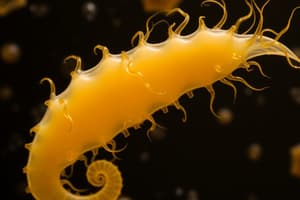Podcast
Questions and Answers
Which class does Cryptosporidium sp. belong to?
Which class does Cryptosporidium sp. belong to?
- Cryptogragaria
- Gregarinomorphea
- Cryptogregarida
- Apicomplexa (correct)
What is the most relevant agent in cases of diarrhea caused by Cryptosporidium?
What is the most relevant agent in cases of diarrhea caused by Cryptosporidium?
- C. felis
- C. meleagridis
- C. hominis
- C. parvum (correct)
How many species of Cryptosporidium have been described?
How many species of Cryptosporidium have been described?
- 37 (correct)
- 17
- Not mentioned
- Variable
What is the transmission mode of Cryptosporidium?
What is the transmission mode of Cryptosporidium?
Which age group is most affected by Cryptosporidium-related diarrhea?
Which age group is most affected by Cryptosporidium-related diarrhea?
¿Cuál es la forma infectante de Cryptosporidium?
¿Cuál es la forma infectante de Cryptosporidium?
¿Cuál es el orden al que pertenece Cryptosporidium?
¿Cuál es el orden al que pertenece Cryptosporidium?
¿Cuál es el agente etiológico más relevante en casos de diarrea causada por Cryptosporidium?
¿Cuál es el agente etiológico más relevante en casos de diarrea causada por Cryptosporidium?
¿Cuál es la principal forma de transmisión de Cryptosporidium?
¿Cuál es la principal forma de transmisión de Cryptosporidium?
¿Cuántas especies de Cryptosporidium han sido descritas?
¿Cuántas especies de Cryptosporidium han sido descritas?
Study Notes
Classification and Taxonomy
- Cryptosporidium sp. belongs to the class Coccidia.
- It is a member of the order Eucoccidiorida.
Species and Prevalence
- Over 30 species of Cryptosporidium have been described, affecting various hosts.
Pathogenicity
- The most relevant agent in cases of diarrhea caused by Cryptosporidium is Cryptosporidium parvum.
Transmission
- The main mode of transmission for Cryptosporidium is through the fecal-oral route, often via contaminated water or food.
- Infection can occur from direct contact with infected individuals or animals.
Affected Populations
- Children and immunocompromised individuals are most affected by Cryptosporidium-related diarrhea.
Infective Form
- The infective form of Cryptosporidium is the oocyst, a hardy cystic stage capable of surviving harsh environmental conditions.
Studying That Suits You
Use AI to generate personalized quizzes and flashcards to suit your learning preferences.
Description
Test your knowledge on cryptosporidiosis and the Cryptosporidium parasite with this quiz. Learn about the taxonomy and general concepts of this Apicomplexa parasite, its role in intestinal infections in both immunocompetent and immunocompromised individuals, and its significance as a cause of diarrheal illness in children under 2 years old.




